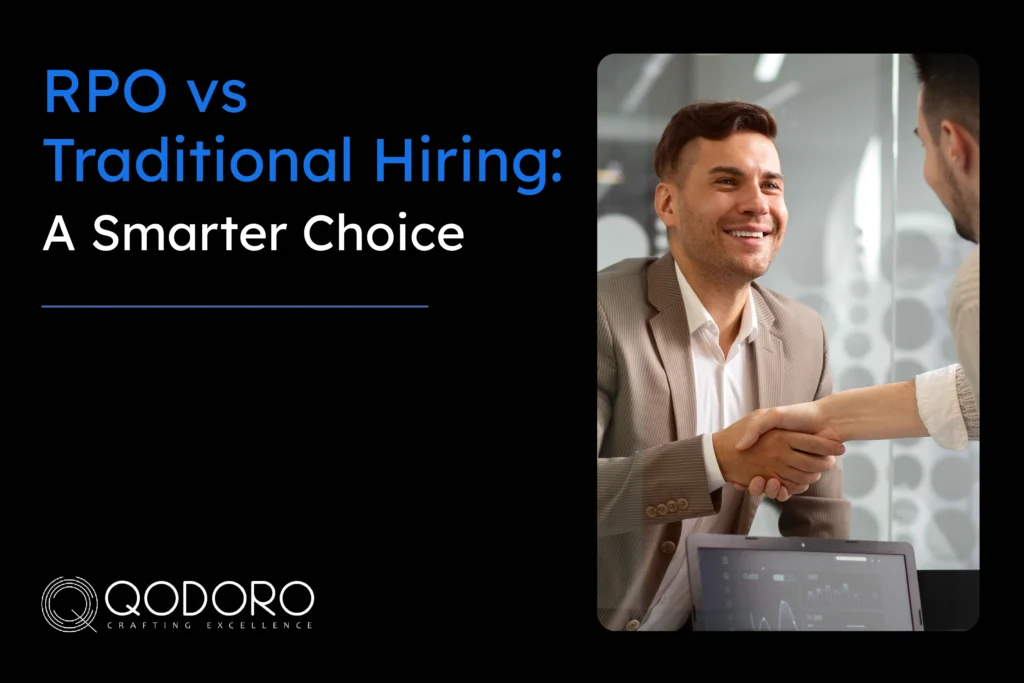
Published on: 03/07/2025

SHARE
In today’s fast-paced and talent-hungry world, hiring the right candidate isn’t just a task, it’s a strategic advantage. Businesses are realizing that their recruitment approach can make or break growth. And that’s where the debate of RPO vs Traditional Hiring comes in.
Traditional hiring methods, while familiar, often fall short when it comes to scalability, speed, and access to top-tier talent. On the other hand, Recruitment Process Outsourcing (RPO) is rapidly gaining ground as a modern, efficient, and scalable alternative.
In this blog, we’ll explore 7 key ways RPO outperforms traditional hiring and why it might be time to make the switch.
One of the biggest limitations of traditional hiring is its rigidity. Internal HR teams have a fixed bandwidth, and scaling recruitment up or down requires significant time and resources. This becomes a serious hurdle when companies face seasonal spikes, rapid expansions, or unexpected hiring surges.
RPO providers offer unmatched scalability. Whether you need to hire 5 people or 500, RPO services can quickly adapt to your changing needs. They have large talent acquisition teams, flexible infrastructure, and proven strategies to handle fluctuations efficiently. This makes RPO ideal for startups scaling up or enterprises entering new markets.
One of the biggest limitations of traditional hiring is its rigidity. Internal HR teams have a fixed bandwidth, and scaling recruitment up or down requires significant time and resources. This becomes a serious hurdle when companies face seasonal spikes, rapid expansions, or unexpected hiring surges.
RPO providers offer unmatched scalability. Whether you need to hire 5 people or 500, RPO services can quickly adapt to your changing needs. They have large talent acquisition teams, flexible infrastructure, and proven strategies to handle fluctuations efficiently. This makes RPO ideal for startups scaling up or enterprises entering new markets.
When comparing RPO vs traditional hiring, cost is one of the most compelling reasons companies choose RPO. Traditional hiring involves high operational costs, job ads, internal HR salaries, agency fees, and the long time it takes to fill a role (which itself is expensive).
RPO services, on the other hand, often operate on a performance-based or flat-fee model, giving better control over hiring budgets. They also reduce time-to-hire, which translates directly into cost savings.
Additionally, RPO providers come with built-in recruitment tech, ATS (applicant tracking systems), and access to job boards saving businesses from investing in these individually.
Traditional hiring usually relies on internal networks, job portals, and recruiter reach. This narrows down the candidate pool and limits the diversity and quality of applicants.
RPO providers have access to expansive talent networks, databases, and passive candidates that traditional recruiters often overlook. They’re proactive, using advanced sourcing tools, social media platforms, and data-driven strategies to identify top talent even those not actively looking for a job.
They also focus on talent mapping and competitor benchmarking to ensure you get the best in the market, not just the best looking for a job.
Time is critical when it comes to hiring. The longer a position stays open, the more productivity and revenue a company can lose. Traditional hiring processes are often bogged down by resume piles, slow interview scheduling, and limited recruiter bandwidth.
RPO services drastically reduce this timeline. With dedicated recruiters, optimized workflows, automation tools, and candidate pipelines always ready, RPO providers can fill roles much faster.
According to industry benchmarks, RPO can reduce time-to-hire by 40–60% compared to traditional methods.
Today’s job seekers care about more than just a paycheck. They want to work for organizations that resonate with their values, offer meaningful work, and have a strong culture. That’s where employer branding plays a huge role.
In traditional hiring, employer branding often takes a backseat. Overworked HR teams focus more on filling roles than crafting a candidate experience. This can hurt your reputation and ability to attract top talent.
RPO providers understand the power of employer branding. They work closely with you to ensure your values, mission, and culture shine throughout the recruitment journey from job descriptions to interview interactions.
They also enhance the candidate experience by ensuring timely communication, respectful interactions, and smooth onboarding.
Traditional hiring decisions often rely on instinct, gut feeling, or subjective judgment. This can lead to inconsistent hiring quality, bias, and higher attrition rates.
RPO services bring a data-first approach. They use advanced analytics, recruitment dashboards, and performance metrics to measure everything from source effectiveness to candidate engagement to hiring manager satisfaction.
With Recruitment Process Outsourcing, you can track KPIs like cost-per-hire, time-to-hire, offer acceptance rate, and more. This helps you refine your hiring process and make better decisions.
When your internal teams are busy handling recruitment, they lose focus from strategic tasks, employee development, engagement, training, and long-term workforce planning.
By outsourcing recruitment to RPO providers, your HR and leadership teams can shift their focus back to what matters most: growth, culture, and employee success.
RPO isn’t just a cost-saving tactic, it’s a business enabler.
When looking at RPO vs Traditional Hiring, the differences are clear. Traditional hiring doesn’t scale well. If you suddenly need to hire a lot of people, your internal HR team might not be able to keep up. RPO services, on the other hand, are flexible and can quickly adjust to your hiring needs. Traditional hiring also costs more in the long run because of job ads, agency fees, and the time it takes to fill roles. RPO is usually more affordable and gives you better control over your budget.
Finding good candidates is also easier with RPO. Traditional hiring often depends on a few job portals or personal contacts, but RPO providers have access to a much wider and more diverse talent pool. They can even find candidates who aren’t actively looking for jobs. RPO also helps fill roles faster, while traditional hiring can be slow and time-consuming.
Employer branding is another key area. In traditional hiring, it’s often ignored. But RPO makes sure your company values and image are shared clearly with every candidate. When it comes to data, traditional hiring usually doesn’t track much. RPO uses data and reports to improve the hiring process. And finally, with traditional hiring, your internal team can get overwhelmed. RPO takes the pressure off, so your team can focus on other important work.
If you’re a growing startup, an enterprise expanding into new markets, or simply tired of long hiring cycles and mediocre results, RPO might be the game-changer you need.
However, success depends on choosing the right partner. Look for RPO providers who understand your industry, have a proven track record, and offer customized solutions.
Before switching to RPO, take a step back and look at your current hiring process. Are you finding it hard to hire the right people? Is your team stretched too thin? If yes, RPO could be a smart move. A good RPO partner doesn’t just help you hire, they work like an extension of your team, bringing in the right tools, experience, and support to make hiring faster and easier for the long run.
The hiring landscape is evolving and fast. In the battle of RPO vs Traditional Hiring, RPO clearly brings more agility, efficiency, and impact to the table.
From cutting costs and time-to-hire to delivering high-quality candidates and improving employer branding, Recruitment Process Outsourcing is no longer a “nice-to-have.” It’s a strategic tool that can give your business a serious competitive edge.
So the next time you find yourself stuck in a hiring bottleneck, ask yourself:
Are you ready to move from traditional to transformational?
Yes! Many RPO providers offer modular or project-based solutions tailored to a business’s size and hiring needs.
Not at all. In fact, it often reduces costs by streamlining processes, reducing time-to-hire, and improving hire quality.
No. You’ll still have complete visibility and decision-making power. RPO partners work as extensions of your team, not replacements.

